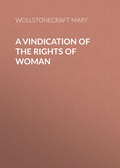
Wollstonecraft Mary
Mary Wollstonecraft's Original Stories
CHAPTER IV
Anger. – History of Jane Fretful.
A few days after these walks and conversations, Mrs. Mason heard a great noise in the play-room. She ran hastily to enquire the cause, and found the children crying, and near them, one of the young birds lying on the floor dead. With great eagerness each of them tried, the moment she entered, to exculpate herself, and prove that the other had killed the bird. Mrs. Mason commanded them to be silent; and, at the same time, called an orphan whom she had educated, and desired her to take care of the nest.
The cause of the dispute was easily gathered from what they both let fall. They had contested which had the best right to feed the birds. Mary insisted that she had a right, because she was the eldest; and Caroline, because she took the nest. Snatching it from one side of the room to the other, the bird fell, and was trodden on before they were aware.
When they were a little composed, Mrs. Mason calmly thus addressed them: – I perceive that you are ashamed of your behaviour, and sorry for the consequence; I will not therefore severely reprove you, nor add bitterness to the self-reproach you must both feel, – because I pity you. You are now inferiour to the animals that graze on the common; reason only serves to render your folly more conspicuous and inexcusable. Anger, is a little despicable vice: its selfish emotions banish compassion, and undermine every virtue. It is easy to conquer another; but noble to subdue oneself. Had you, Mary, given way to your sister’s humour, you would have proved that you were not only older, but wiser than her. And you, Caroline, would have saved your charge, if you had, for the time, waved your right.
It is always a proof of superiour sense to bear with slight inconveniences, and even trifling injuries, without complaining or contesting about them. The soul reserves its firmness for great occasions, and then it acts a decided part. It is just the contrary mode of thinking, and the conduct produced by it, which occasions all those trivial disputes that slowly corrode domestic peace, and insensibly destroy what great misfortunes could not sweep away.
I will tell you a story, that will take stronger hold on your memory than mere remarks.
Jane Fretful was an only child. Her fond weak mother would not allow her to be contradicted on any occasion. The child had some tenderness of heart; but so accustomed was she to see every thing give way to her humour, that she imagined the world was only made for her. If any of her playfellows had toys, that struck her capricious sickly fancy, she would cry for them; and substitutes were in vain offered to quiet her, she must have the identical ones, or fly into the most violent passion. When she was an infant, if she fell down, her nurse made her beat the floor. She continued the practice afterwards, and when she was angry would kick the chairs and tables, or any senseless piece of furniture, if they came in her way. I have seen her throw her cap into the fire, because some of her acquaintance had a prettier.
Continual passions weakened her constitution; beside, she would not eat the common wholesome food that children, who are subject to the small-pox and worms, ought to eat, and which is necessary when they grow so fast, to make them strong and handsome. Instead of being a comfort to her tender, though mistaken, mother, she was her greatest torment. The servants all disliked her; she loved no one but herself; and the consequence was, she never inspired love; even the pity good-natured people felt, was nearly allied to contempt.
A lady, who visited her mother, brought with her one day a pretty little dog. Jane was delighted with it; and the lady, with great reluctance, parted with it to oblige her friend. For some time she fondled, and really felt something like an affection for it: but, one day, it happened to snatch a cake she was going to eat, and though there were twenty within reach, she flew into a violent passion, and threw a stool at the poor creature, who was big with pup. It fell down; I can scarcely tell the rest; it received so severe a blow, that all the young were killed, and the poor wretch languished two days, suffering the most excruciating torture.
Jane Fretful, who was now angry with herself, sat all the time holding it, and every look the miserable animal gave her, stung her to the heart. After its death she was very unhappy; but did not try to conquer her temper. All the blessings of life were thrown away on her; and, without any real misfortune, she was continually miserable.
If she had planned a party of pleasure, and the weather proved unfavourable, the whole day was spent in fruitless repining, or venting her ill-humour on those who depended on her. If no disappointment of that kind occurred, she could not enjoy the promised pleasure; something always disconcerted her; the horses went too fast, or, too slow; the dinner was ill-dressed, or, some of the company contradicted her.
She was, when a child, very beautiful; but anger soon distorted her regular features, and gave a forbidding fierceness to her eyes. But if for a moment she looked pleased, she still resembled a heap of combustible matter, to which an accidental spark might set fire; of course quiet people were afraid to converse with her. And if she ever did a good, or a humane action, her ridiculous anger soon rendered it an intolerable burden, if it did not entirely cancel it.
At last she broke her mother’s heart, or hastened her death, by her want of duty, and her many other faults: all proceeding from violent, unrestrained anger.
The death of her mother, which affected her very much, left her without a friend. She would sometimes say, Ah! my poor mother, if you were now alive, I would not teaze you – I would give the world to let you know that I am sorry for what I have done: you died, thinking me ungrateful; and lamenting that I did not die when you gave me suck. I shall never – oh! never see you more.
This thought, and her peevish temper, preyed on her impaired constitution. She had not, by doing good, prepared her soul for another state, or cherished any hopes that could disarm death of its terrors, or render that last sleep sweet – its approach was dreadful! – and she hastened her end, scolding the physician for not curing her. Her lifeless countenance displayed the marks of convulsive anger; and she left an ample fortune behind her to those who did not regret her loss. They followed her to the grave, on which no one shed a tear. She was soon forgotten; and I only remember her, to warn you to shun her errors.
CHAPTER V
Lying. – Honour. – Truth. – Small Duties. – History of Lady Sly, and Mrs. Trueman.
The little girls were very assiduous to gain Mrs. Mason’s good opinion; and, by the mildness of their behaviour, to prove to her that they were ashamed of themselves. It was one of Mrs. Mason’s rules, when they offended her, that is, behaved improperly, to treat them civilly; but to avoid giving them those marks of affection which they were particularly delighted to receive.
Yesterday, said she to them, I only mentioned to you one fault, though I observed two. You very readily guess I mean the lie that you both told. Nay, look up, for I wish to see you blush; and the confusion which I perceive in your faces gives me pleasure; because it convinces me that it is not a confirmed habit: and, indeed, my children, I should be sorry that such a mean one had taken deep root in your infant minds.
When I speak of falsehood, I mean every kind; whatever tends to deceive, though not said in direct terms. Tones of voice, motions of the hand or head, if they make another believe what they ought not to believe, are lies, and of the worst kind; because the contrivance aggravates the guilt. I would much sooner forgive a lie told directly, when perhaps fear entirely occupied the thoughts, and the presence of God was not felt: for it is His sacred Majesty that you affront by telling an untruth.
How so? enquired Mary.
Because you hope to conceal your falsehood from every human creature: but, if you consider a moment, you must recollect, that the Searcher of hearts reads your very thoughts; that nothing is hid from him.
You would blush if I were to discover that you told a lie; yet wantonly forfeit the favour of Him, from whom you have received life and all its blessings, to screen yourselves from correction or reproof, or, what is still worse, to purchase some trifling gratification, the pleasure of which would last but a moment.
You heard the gentleman who visited me this morning, very frequently use the word Honour. Honour consists in respecting yourself; in doing as you would be done by; and the foundation of honour is Truth.
When I can depend on the veracity of people, that is to say, am convinced that they adhere to truth, I rely on them; am certain they have courage, because I know they will bear any inconvenience rather than despise themselves, for telling a lie. Besides, it is not necessary to consider what you intend to say, when you have done right. Always determine, on every occasion, to speak the truth, and you will never be at a loss for words. If your character for this scrupulous attention is once fixed, your acquaintance will be courted; and those who are not particularly pleased with you, will, at least, respect your honourable principles. It is impossible to form a friendship without making truth the basis; it is indeed the essence of devotion, the employment of the understanding, and the support of every duty.
I govern my servants, and you, by attending strictly to truth, and this observance keeping my head clear and my heart pure, I am ever ready to pray to the Author of good, the Fountain of truth.
While I am discussing the subject, let me point out to you another branch of this virtue; Sincerity. – And remember that I every day set you an example; for I never, to please for the moment, pay unmeaning compliments, or permit any words to drop from my tongue, that my heart does not dictate. And when I relate any matter of fact, I carefully avoid embellishing it, in order to render it a more entertaining story; not that I think such a practice absolutely criminal; but as it contributes insensibly to wear away a respect for truth, I guard against the vain impulse, lest I should lose the chief strength, and even ornament, of my mind, and become like a wave of the sea, drifted about by every gust of passion.
You must in life observe the most apparently insignificant duties – the great ones are the pillars of virtue; but the constant concurrence of trifling things, makes it necessary that reason and conscience should always preside, to keep the heart steady. Many people make promises, and appointments, which they scruple not to break, if a more inviting pleasure occurs, not remembering that the slightest duty should be performed before a mere amusement is pursued – for any neglect of this kind embitters play. Nothing, believe me, can long be pleasant, that is not innocent.
As I usually endeavour to recollect some persons of my acquaintance, who have suffered by the faults, or follies, I wish you to avoid; I will describe two characters, that will, if I mistake not, very strongly enforce what I have been saying.
Last week you saw Lady Sly, who came to pay me a morning visit. Did you ever see such a fine carriage, or such beautiful horses? How they pawed the ground, and displayed their rich harnesses! Her servants wore elegant liveries, and her own clothes suited the equipage. Her house is equal to her carriage; the rooms are lofty, and hung with silk; noble glasses and pictures adorn them: and the pleasure-grounds are large and well laid out; beside the trees and shrubs, they contain a variety of summer-houses and temples, as they are called. – Yet my young friends, this is state, not dignity.
This woman has a little soul, she never attended to truth, and obtaining great part of her fortune by falsehood, it has blighted all her enjoyments. She inhabits that superb house, wears the gayest clothes, and rides in that beautiful carriage, without feeling pleasure. Suspicion, and the cares it has given birth to, have wrinkled her countenance, and banished every trace of beauty, which paint in vain endeavours to repair. Her suspicious temper arises from a knowledge of her own heart, and the want of rational employments.
She imagines that every person she converses with means to deceive her; and when she leaves a company, supposes all the ill they may say of her, because she recollects her own practice. She listens about her house, expecting to discover the designs of her servants, none of whom she can trust; and in consequence of this anxiety her sleep is unsound, and her food tasteless. She walks in her paradise of a garden, and smells not the flowers, nor do the birds inspire her with cheerfulness. – These pleasures are true and simple, they lead to the love of God, and all the creatures whom He hath made – and cannot warm a heart which a malicious story can please.
She cannot pray to God; – He hates a liar! She is neglected by her husband, whose only motive for marrying her was to clear an incumbered estate. Her son, her only child, is undutiful; the poor never have cause to bless her; nor does she contribute to the happiness of any human being.
To kill time, and drive away the pangs of remorse, she goes from one house to another, collecting and propagating scandalous tales, to bring others on a level with herself. Even those who resemble her are afraid of her; she lives alone in the world, its good things are poisoned by her vices, and neither inspire joy nor gratitude.
Before I tell you how she acquired these vicious habits, and enlarged her fortune by disregarding truth, I must desire you to think of Mrs. Trueman, the curate’s wife, who lives in yonder white house, close to the church; it is a small one, yet the woodbines and jessamins that twine about the windows give it a pretty appearance. Her voice is sweet, her manners not only easy, but elegant; and her simple dress makes her person appear to the greatest advantage.
She walks to visit me, and her little ones hang on her hands, and cling to her clothes, they are so fond of her. If any thing terrifies them, they run under her apron, and she looks like the hen taking care of her young brood. The domestic animals play with the children, finding her a mild attentive mistress; and out of her scanty fortune she contrives to feed and clothe many a hungry shivering wretch; who bless her as she passes along.
Though she has not any outward decorations, she appears superior to her neighbours, who call her the Gentlewoman; indeed every gesture shews an accomplished and dignified mind, that relies on itself; when deprived of the fortune which contributed to polish and give it consequence.
Drawings, the amusement of her youth, ornament her neat parlour; some musical instruments stand in one corner; for she plays with taste, and sings sweetly.
All the furniture, not forgetting a book-case, full of well-chosen books, speak the refinement of the owner, and the pleasures a cultivated mind has within its own grasp, independent of prosperity.
Her husband, a man of taste and learning, reads to her, while she makes clothes for her children, whom she teaches in the tenderest, and most persuasive manner, important truths and elegant accomplishments.
When you have behaved well for some time you shall visit her, and ramble in her little garden; there are several pretty seats in it, and the nightingales warble their sweetest songs, undisturbed, in the shade.
I have now given you an account of the present situation of both, and of their characters; listen to me whilst I relate in what manner these characters were formed, and the consequence of each adhering to a different mode of conduct.
Lady Sly, when she was a child, used to say pert things, which the injudicious people about her laughed at, and called very witty. Finding that her prattle pleased, she talked incessantly, and invented stories, when adding to those that had some foundation, was not sufficient to entertain the company. If she stole sweetmeats, or broke any thing, the cat, or the dog, was blamed, and the poor animals were corrected for her faults; nay, sometimes the servants lost their places in consequence of her assertions. Her parents died and left her a large fortune, and an aunt, who had a still larger, adopted her.
Mrs. Trueman, her cousin, was, some years after, adopted by the same lady; but her parents could not leave their estate to her, as it descended to the male heir. She had received the most liberal education, and was in every respect the reverse of her cousin; who envied her merit, and could not bear to think of her dividing the fortune which she had long expected to inherit entirely herself. She therefore practised every mean art to prejudice her aunt against her, and succeeded.
A faithful old servant endeavoured to open her mistress’s eyes; but the cunning niece contrived to invent the most infamous story of the old domestic, who was in consequence of it dismissed. Mrs. Trueman supported her, when she could not succeed in vindicating her, and suffered for her generosity; for her aunt dying soon after, left only five hundred pounds to this amiable woman, and fifty thousand to Lady Sly.
They both of them married shortly after. One, the profligate Lord Sly, and the other a respectable clergyman, who had been disappointed in his hopes of preferment. This last couple, in spite of their mutual disappointments, are contented with their lot; and are preparing themselves and children for another world, where truth, virtue and happiness dwell together.
For believe me, whatever happiness we attain in this life, must faintly resemble what God Himself enjoys, whose truth and goodness produce a sublime degree, such as we cannot conceive, it is so far above our limited capacities.
I did not intend to detain you so long, said Mrs. Mason; have you finished Mrs. Trimmer’s Fabulous Histories? Indeed we have, answered Caroline, mournfully, and I was very sorry to come to the end. I never read such a pretty book; may I read it over again to Mrs. Trueman’s little Fanny? Certainly, said Mrs. Mason, if you can make her understand that birds never talk. Go and run about the garden, and remember the next lie I detect, I shall punish; because lying is a vice; – and I ought to punish you if you are guilty of it, to prevent your feeling Lady Sly’s misery.
CHAPTER VI
Anger. – Folly produces Self-contempt, and the Neglect of others.
Mrs. Mason had a number of visitors one afternoon, who conversed in the usual thoughtless manner which people often fall into who do not consider before they speak; they talked of Caroline’s beauty, and she gave herself many affected airs to make it appear to the best advantage. But Mary, who had not a face to be proud of, was observing some peculiarities in the dress or manners of the guests; and one very respectable old lady, who had lost her teeth, afforded her more diversion than any of the rest.
The children went to bed without being reproved, though Mrs. Mason, when she dismissed them, said gravely, I give you to-night a kiss of peace, an affectionate one you have not deserved. They therefore discovered by her behaviour that they had done wrong, and waited for an explanation to regain her favour.
She was never in a passion, but her quiet steady displeasure made them feel so little in their own eyes, they wished her to smile that they might be something; for all their consequence seemed to arise from her approbation. I declare, said Caroline, I do not know what I have done, and yet I am sure I never knew Mrs. Mason find fault without convincing me that I had done wrong. Did you, Mary, ever see her in a passion? No, said Mary, I do believe that she was never angry in her life; when John threw down all the china, and stood trembling, she was the first to say that the carpet made him stumble. Yes, now I do remember, when we first came to her house, John forgot to bring the cow and her young calf into the cow-house; I heard her bid him do it directly, and the poor calf was almost frozen to death – she spoke then in a hurry, and seemed angry. Now you mention it, I do recollect, replied Caroline, that she was angry, when Betty did not carry the poor sick woman the broth she ordered her to take to her. But this is not like the passion I used to see nurse in, when any thing vexed her. She would scold us, and beat the girl who waited on her. Poor little Jenny, many a time was she beaten, when we vexed nurse; I would tell her she was <not> to blame now if I saw her – and I would not tease her any more.
I declare I cannot go to sleep, said Mary, I am afraid of Mrs. Mason’s eyes – would you think, Caroline, that she who looks so very good-natured sometimes, could frighten one so? I wish I were as wise and as good as she is. The poor woman with the six children, whom we met on the common, said she was an angel, and that she had saved her’s and her children’s lives. My heart is in my mouth, indeed, replied Caroline, when I think of to-morrow morning, and yet I am much happier than I was when we were at home. I cried, I cannot now tell for what, all day; I never wished to be good – nobody told me what it was to be good. I wish to be a woman, said Mary, and to be like Mrs. Mason, or Mrs. Trueman, – we are to go to see her if we behave well.
Sleep soon over-powered them, and they forgot their apprehensions. In the morning they awoke refreshed, and took care to learn their lessons, and feed the chickens, before Mrs. Mason left her chamber.






